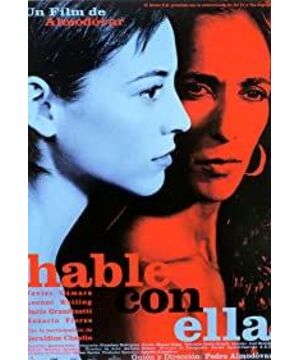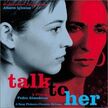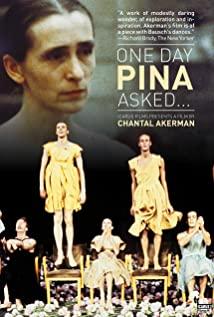This is the description used by ballerina Aricia's teacher when she talks about "trenches" at around 40 minutes.
"Men create women" can be understood as the male as the main body and the source of power; but it can also be understood as the female as the main body, at this time the male is only the soil as the nutrient base and background. The dialogue in the play clearly uses the latter metaphor. Because what follows immediately is the confrontation of the next sentence: death creates life. Unlike traditional poetry, where the earth is often compared to the mother, the male is clearly compared to the character who gave birth to all things.
And this happened to be a scene that was repeatedly criticized by female audiences: Benigno responded with unpoetic beaches or water - he did not understand or appreciate the deep meaning of "trenches"; he was not qualified to be Arisia's spiritual partner , and obviously will not be favored by the goddess - even if, in essence, he later used action and life, more than any poet or dancer to fully practice this text.
Words are delicate and fickle, and women are often more in love with words. It's like the novelist Mark has finally captured the heart of the goddess.
Similar to most films with a strong female color, "Tell Her" does not reverse the role of the strong to women, but only portrays men in a more vulnerable and passive temperament. However, the competition and tension of the forces set in the castle in the air are always unavoidable because they go against the facts. Although, as a delicate work of art, it is still excellent.
…………………………
Benigno's love is completely feminine. He worshipped the goddess, and this worship manifested in the fact that he never wanted to conquer her, but to become her. He had spent four years trying to live in her world, albeit clumsily to the point. But he is always trying to empathize, which is not so much effort as it is instinct. He did his best to take care of his mother because he regretted that she had given up on him, and he saw at a glance that the bullfighter was "uncomfortable", "because of dry skin". Although he is one-way talking to himself, he does not live in his own world. Given the chance, I'm sure he'd be a listener. He is actually a bit of Jia Baoyu.
Women more uphold this type of devotion, immersion and service love, which may originate from motherhood, because the stimulation of motherhood is a process of "death creates life".
However, because he is wrapped in a male skin, only this one, even the humblest love will appear aggressive. His stalking and "harassment" are actually very restrained, but he still frequently "scares the opponent". Inspired by the "shrinking lover", his salvation in exchange for death is always remembered as a hideous rapist, not even known to the goddess.
It's entirely conceivable how the story would react differently if he were a lesbian character. However, he's just a fat, creepy, unsexy, perverted, downright failure, man.
…………………………
Wen Qing Mark's sentimentality and femininity are adept at writing, but he is masculine: egocentric, controlling, practical. As a rare female bullfighter, Lydia should have a rich world, but he turns a blind eye and is only interested in this aspect of her as a "desperate woman". He refuses to speak to his vegetative lover. This utilitarian and functional attitude is distinct from the romanticism of his literature: because all he needs is an echo of his own world. Losing the feedback from the listeners, his love naturally came to an abrupt end.
It's hard to argue that being afraid of snakes wasn't an intentional arrangement. "I will greatly increase your pain in childbirth, and you will suffer in childbearing. You will desire your husband, and your husband will rule over you." However, to resist the attack of the serpent, you must rely on men. When he rescued her from the threat of snakes, as a weak scholar who did not understand and could not control the power, danger and blood in the bullfighting world, he became a hero who saved the beauty at this time, and even finally got the data Favored by dancers who say they can understand "trenches". Does it mean that if women are spared the "pain of childbirth", they no longer have the imagined "disadvantage"? However, the woman who stayed away from the viper died, and the woman who gave birth to a dead baby lived. And this woman who survived finally fell in love with the man who never participated in life and death, but was always just a bystander.
This is probably the world of literature and art, as well as the ideal world of artists!
View more about Talk to Her reviews










